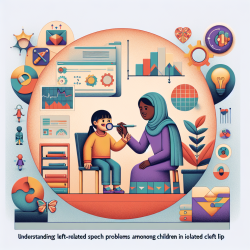Introduction
The devastating 7.8 magnitude earthquake that struck Nepal in 2015 left a profound impact not only on the physical infrastructure but also on the mental health of its population. The study "Investigating the Aftershock of a Disaster: A Study of Health Service Utilization and Mental Health Symptoms in Post-Earthquake Nepal" sheds light on the critical role of healthcare access in mitigating mental health symptoms post-disaster. This blog explores how practitioners can leverage these insights to improve mental health outcomes in disaster-affected communities.
Key Findings from the Study
The research conducted 15 months post-earthquake involved 750 individuals from six districts in Nepal. It highlighted several key findings:
- Females and individuals aged 40-50 exhibited higher levels of anxiety and depression.
- Participants utilizing district hospitals reported the lowest anxiety and depression scores.
- Those relying on medical shops for health information showed higher anxiety and depression levels.
- Higher perceived quality of healthcare was associated with fewer mental health symptoms.
Implications for Practitioners
For practitioners, these findings underscore the importance of improving healthcare access and quality in disaster-affected areas. Here are some actionable steps:
1. Enhance Access to District Hospitals
District hospitals play a crucial role in reducing mental health symptoms. Practitioners should advocate for better access to these facilities, especially for low-income populations who may face financial and logistical barriers.
2. Train Traditional Healers
Traditional healers are often the first point of contact in rural areas. Training them in basic mental health support and referral processes can help bridge the gap in mental health services.
3. Improve Quality of Care
Perceived quality of care significantly impacts mental health outcomes. Practitioners should focus on building trust and approachability in healthcare providers to enhance service utilization.
Encouraging Further Research
The study highlights the need for ongoing research to understand the long-term impacts of healthcare access on mental health post-disaster. Practitioners are encouraged to engage in research initiatives that explore innovative solutions for improving mental health care in low-resource settings.
Conclusion
Understanding the intricate relationship between healthcare access and mental health is crucial for effective disaster recovery. By implementing the insights from this study, practitioners can play a pivotal role in fostering resilience and recovery in disaster-affected communities.
To read the original research paper, please follow this link: Investigating the Aftershock of a Disaster: A Study of Health Service Utilization and Mental Health Symptoms in Post-Earthquake Nepal.










